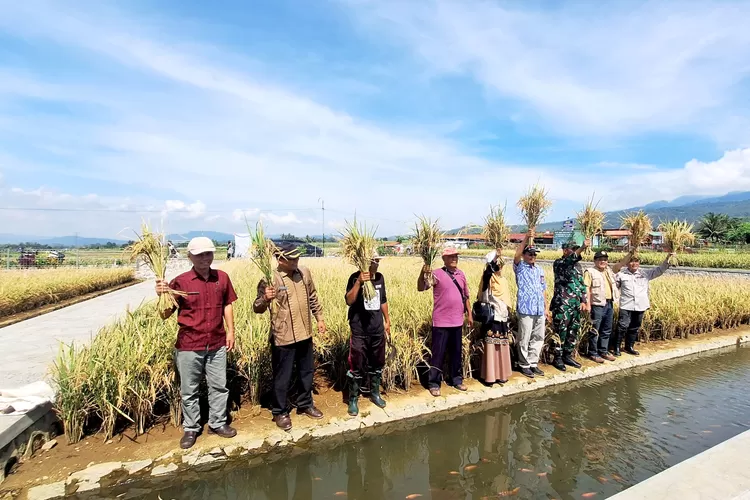Jenderal Soedirman University (Unsoed) has shown the positive impact that its campus has on the surrounding community through the Minapadi Protani Salibu innovation in Panembangan Village, Cilongok District, Banyumas. This program has successfully increased farmer productivity and promoted sustainable economic growth in the village.
The Inpago Unsoed Protani breeding team, which includes Prof. Ir. Totok Agung Dwi Haryanto, Dr. Dyah Susanti, and Dr. Agus Riyanto, has successfully integrated the cultivation of the superior Inpago Protani rice variety with Salibu technology. This innovative approach has boosted rice productivity, allowing for three to four harvests per year.
Furthermore, the Protani variety boasts a higher protein content compared to regular rice, contributing to a reduction in stunting rates caused by protein deficiency. As a result, farmers’ incomes have increased, food security has been preserved, and the community’s protein intake has improved.
This innovation extends beyond the agricultural sector. The program promotes educational tourism related to agriculture in the Svarga Minapadi Panembangan area, which had previously declined in 2019 due to a lack of planting seasons. The increased frequency of harvests, resulting from the use of the Protani Salibu variety, has revitalized the region’s productivity.
Minapadi is a system that combines rice cultivation with fish farming (mina) on the same land, based on the principle of mutualistic symbiosis. The fertile rice fields in Panembangan benefit from being free of larvae and insect pests, while the fish thrive by feeding on these pests. This system not only supports the tourism sector but also helps with natural pest control in the rice fields.
The Krido Yuwono Farmers and Fish Farmers Group has embraced this program, collaborating with a team of researchers from Unsoed through a minapadi-based Village Assistance Programme. The goal of this collaboration is to create an innovative village ecosystem by harmoniously integrating agriculture, fisheries, technology, and tourism, ultimately reviving the productivity of farmers in the village.
In an interview conducted on Wednesday, May 28, Soleh, an official from Panembangan Village, stated that the use of the Protani rice variety has successfully increased yields to seven tonnes per hectare, with the rice quality classified as premium. The implementation of the Salibu system has faced challenges, such as rat infestations; however, these issues can be addressed through the cooperation of farmers and residents. Active community participation not only strengthens agricultural resilience but also fosters a spirit of togetherness in maintaining the sustainability of the innovations that have been introduced.
Throughout the implementation process, from planting to harvesting, the team from Unsoed consistently provided support to farmer groups and the local community. Initial assistance included the provision of Inpago Unsoed Protani rice seeds, the sharing of information on rice production and planting methods, and tools for making floating pellets. These efforts aimed to help reduce cultivation costs, which are the largest component of rice production expenses.
The support provided by students and lecturers continues until the harvest season, with team members visiting the community regularly to ensure it feels fully supported. The presence of academics in the field serves not only as a means of sharing knowledge but also as a testament to Unsoed’s commitment to the sustainability of the program and the future independence of farmers.
“We should not be left behind; we still really need the assistance of scientists to increase rice productivity. We are eager to build a friendly relationship with the scientists at Unsoed, especially in the areas of agriculture and fisheries, and to appreciate the hard work of these scientists,” said Soleh about the Unsoed program in Panembangan Village.
#unsoed1963#kampusberdampak
















